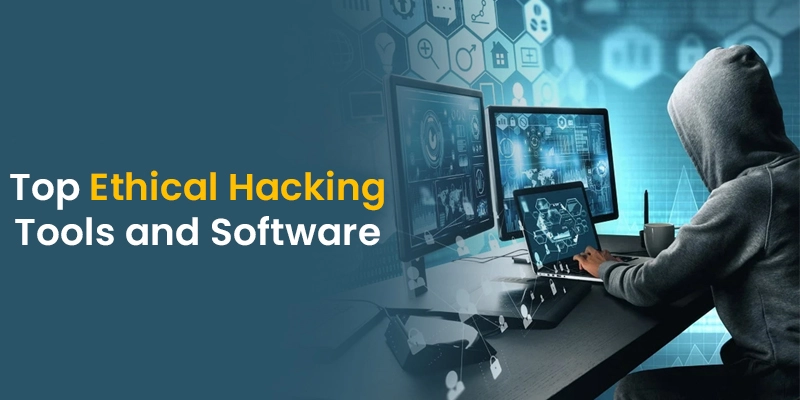Top Tools Every Ethical Hacker Should Know About
Essential Tools for Ethical Hackers: Key Resources to Strengthen Cybersecurity

Ethical hacking, also known as penetration testing or white-hat hacking, is the practice of testing and securing computer systems, networks, and applications by simulating attacks. Ethical hackers use a variety of tools to uncover vulnerabilities and ensure that systems are protected from malicious hackers. Below are some of the top tools every ethical hacker should know about:
1. Kali Linux
Kali Linux is a specialized operating system that comes pre-installed with a wide range of penetration testing and ethical hacking tools. Developed by Offensive Security, Kali Linux is based on Debian and contains over 600 tools for tasks like vulnerability analysis, network monitoring, web application testing, password cracking, and more. Popular tools within Kali include Metasploit, Nmap, Wireshark, and Burp Suite.
Why it's essential: Kali Linux provides a unified platform with everything an ethical hacker needs, streamlining the process of penetration testing.
2. Nmap
Nmap (Network Mapper) is a powerful open-source tool used for network discovery and security auditing. Ethical hackers use Nmap to scan networks, identify hosts, detect open ports, and determine the operating systems and services running on target systems.
Why it's essential: Nmap helps ethical hackers understand the structure of a network and identify potential points of entry for attacks, making it a crucial tool for reconnaissance.
3. Metasploit Framework
Metasploit is one of the most widely used penetration testing frameworks. It allows ethical hackers to find, exploit, and validate vulnerabilities in systems. The Metasploit Framework has an extensive database of exploits and payloads, enabling users to simulate attacks to test system defenses.
Why it's essential: Metasploit is invaluable for testing the real-world effectiveness of a system’s security measures, providing an in-depth analysis of vulnerabilities.
4. Wireshark
Wireshark is a network protocol analyzer that captures and inspects data traveling through a network. It provides a detailed view of network traffic, enabling ethical hackers to detect unusual activity and vulnerabilities. Wireshark supports deep inspection of hundreds of protocols, which is especially useful for network troubleshooting, analysis, and attack detection.
Why it's essential: For ethical hackers, Wireshark is a key tool for sniffing out suspicious traffic, analyzing data packets, and identifying vulnerabilities in real-time communication.
5. Burp Suite
Burp Suite is a popular web application security testing tool. It offers a suite of features, including a proxy server, scanner, and spider, that allow ethical hackers to intercept, modify, and analyze web traffic between browsers and servers. It’s highly effective for finding issues like SQL injection, cross-site scripting (XSS), and other web vulnerabilities.
Why it's essential: As web applications are prime targets for attacks, Burp Suite helps ethical hackers identify and fix security issues in web-based platforms.
6. Hydra
Hydra is a powerful password-cracking tool that supports a wide range of protocols (HTTP, FTP, SSH, etc.). It helps ethical hackers test the strength of user passwords by using brute-force or dictionary attacks.
Why it's essential: Passwords are often the weakest link in security systems. Hydra helps ethical hackers identify weak passwords that could be exploited by malicious hackers.
7. John the Ripper
John the Ripper is another widely used password-cracking tool designed to crack passwords by using various algorithms, including dictionary and brute-force attacks. It is especially effective at cracking UNIX and Windows password hashes.
Why it's essential: John the Ripper allows ethical hackers to test the robustness of password policies and identify vulnerabilities in encrypted password storage systems.
8. Nikto
Nikto is an open-source web server scanner that detects various vulnerabilities like outdated software versions, security misconfigurations, and potential backdoors in web servers. It scans for thousands of known vulnerabilities, making it useful for securing web applications and services.
Why it's essential: Ethical hackers use Nikto to quickly assess the security posture of web servers and ensure they are protected from common attack vectors.
9. Netcat
Netcat, often referred to as the "Swiss army knife" of networking, is a versatile tool for network communication. It allows ethical hackers to create raw network connections and send or receive data between systems. It is widely used for tasks like port scanning, banner grabbing, and transferring files between machines.
Why it's essential: Netcat’s simplicity and versatility make it indispensable for network testing and troubleshooting.
10. Aircrack-ng
Aircrack-ng is a suite of tools for wireless network auditing. It is used to crack WEP and WPA-PSK keys, making it useful for testing the security of wireless networks. Aircrack-ng includes tools for packet capture, injection, and analysis, helping ethical hackers assess wireless network vulnerabilities.
Why it's essential: Given the widespread use of Wi-Fi networks, Aircrack-ng is critical for testing the security of wireless systems and preventing unauthorized access.
Conclusion
Ethical hackers play a crucial role in identifying and mitigating security threats before they can be exploited by malicious actors. The tools listed above are integral to the ethical hacking process, helping professionals conduct thorough penetration tests, uncover vulnerabilities, and ultimately enhance cybersecurity. Mastery of these tools ensures that ethical hackers can effectively secure systems, applications, and networks in today’s increasingly connected world. If you're looking to pursue a career in ethical hacking, an online ethical hacking course in Delhi, Noida, Mumbai, and other parts of India can help you gain practical experience with these essential tools, providing the foundational skills needed to excel in the field.